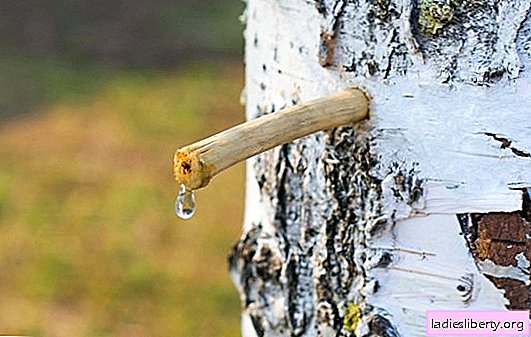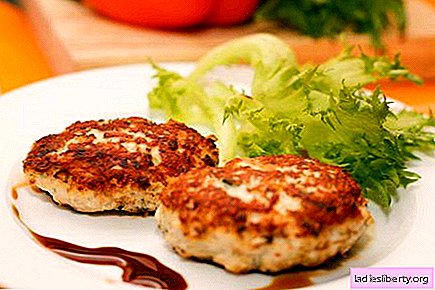
Today, birch sap is a native exotic, which a cup is filled well if once a year.
But it is worth asking - what is it and it will become clear that its unique properties can not be compared with anything that can be extracted from many drugs. But for an informed choice, of course, you need to know everything about birch sap - the benefits and harms of a forest drink in detail.
Once upon a time, when goblin and mermaids were commonplace in our forests, like a strawberry the size of a fist, on a spring day a damsel Lubava came to a birch grove.
Lovely, stately and cheerful, she gathered flowers on a wreath and sang so that even the nightingales listened. Especially one - who was a king among birds. Lyubava fell to his heart so much that he rushed to the ground and turned into a man. Without hiding, he offered to become his wife and promised to throw all the forest riches to her bare feet.
But the girl already had a lover and she rejected the nightingale. He could have enchanted her, but then he would have had to turn black in his heart, and this was contrary to his nature.
When Lyubava left the grove, the nightingale sat on a twig of birch and bitterly mourned it all spring long. His tears fell on the roots of the tree and, together with the waters, entered him.
Thus, birch sap became sweeter and healthier than the sap of all trees, and was also valued by herbalists for cases when it was necessary to remove a love spell or damage from a person.
Birch sap has a light, unobtrusive refreshing taste, a bit sweet, but with sourness. He is not comparable with anything in the world. Sometimes it is possible to catch a specific “woody” shade in it, but it is less noticeable in the juice from young birches. There is no smell at all.
The season of "birch hunting" depends on the local climate, but on average it is mid-March-April. Snow is melting, plus temperatures have set in the afternoon and buds have swollen near the birch. You can take the juice until the leaves begin to appear from them, that is, for about 3 weeks.
It is noteworthy that scientists still have not completely deciphered the chemical composition of birch sap in laboratories, but they have already come to the unequivocal conclusion that this is one of the purest liquids on Earth, not inferior in this respect to the glaciers of Antarctica.
The energy value of the juice is only 18 kcal per 100 ml, but this does not mean that it is useless to replenish the vital resources of the body.
Sugar is represented in it by 2% glucose and fructose, which provide recharging of the brain with energy for its main functions, including mental activity.
The vitamin range is represented in the drink, mainly by group B, which:
- improves mood;
- gives a light fall asleep and a good sleep.
Also responsible for the unique benefits of birch sap are:
- essential oils;
- saponins;
- manganese, silicon, barium, potassium, phosphorus;
- tannins;
- organic acids.
The latter in this drink, unlike the juices of many other plants, not only help to strengthen the immune system, tone up the whole body and inhibit the aging process, but are also not able to damage the oral cavity. Moreover - this woody fluid strengthens tooth enamel, freshens breath, prevents tooth decay.
Raw birch sap is stored in the refrigerator for up to 2 days, after which the fermentation process begins in it. Sometimes it’s good - because from ancient times they prepared kvass from it, as well as sparkling (carbonated) wines. You can also save juice in reserve by creating from it:
- a sterilized drink with sugar, and sometimes with the addition of citrus fruits, currant leaves, apples;
- syrup, very reminiscent of maple, but with a delicate bitterness.
On birch sap, you can bake pancakes and even bread, prepare desserts.
Speaking about the benefits and harms of birch sap, so as not to delve into the academic presentation of the data, it is best to bring its useful properties in simple thematic lists.
Cardiovascular system and blood:
- makes the walls of blood vessels more elastic;
- strengthens the heart muscle;
- removes "bad" cholesterol;
- contributes to the production of hemoglobin;
Musculoskeletal system:
- relieves muscle cramps and cramps;
- cleans joints from salt deposits;
- reduces pain with arthritis;
- strengthens bone tissue.
Genitourinary system:
- dissolves and removes stones, sand from the kidneys;
- relieves swelling caused by water retention;
- acts as a bactericidal in a number of gynecological diseases;
- increases potency.
Respiratory system:
- acts as an expectorant;
- reduces inflammatory processes in the lungs and bronchi;
- treats symptoms of a runny nose;
- contributes to an increase in lung volume with appropriate breathing exercises.
It is recommended to drink birch juice in a quarter to a third of a glass 2-3 times a day with a sluggish appetite and troubled digestion.
Science has confirmed its properties to accelerate metabolism, including energy expenditure during physical exertion, as well as cleanse the body of toxic elements. So it may well be useful in losing weight.
In the old days it was known that birch sap whitens the skin better than cream. Its positive properties continue:
- acne treatment;
- smoothing small wrinkles (for example, under the eyes);
- prevention of the appearance of black dots;
- exfoliation;
- increased tone of the epidermis.
You can prepare masks or confine yourself to rubbing the face with juice as a lotion or an ice cube from it - the result appears within a few days.
Birch sap has wonderful hair care - makes it shiny, accelerates growth, helps to stay fresh longer after washing, and treats dandruff. You can prepare masks (for efficiency, be sure to stand under a towel) and just rinse after applying your favorite shampoo.
With absolute probability there will be no benefit, but harm from birch sap with an allergy to birch pollen already. This rule applies to both its drinking and external use.
And of course, with the independent extraction of juice, it is unacceptable to choose trees growing near roads, landfills, industrial facilities. The juice from a sickly, sick tree will not be so healing. Botanists are advised to go for birch trees to clean groves and forests, where they grow in the diversity of the forest kingdom and, thanks to the processes that have been going on forever in them, are as saturated as possible with useful substances.











